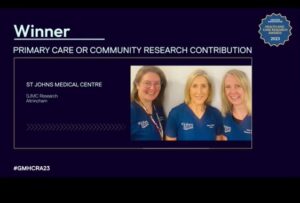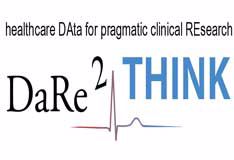St Johns Medical Centre is a ‘Research Active Practice’
St Johns have made a huge contribution to research in the last 12 months, recruiting hundred of patients to a major allergy study and accounting for almost a fifth of all primary care recruitment in Greater Manchester. St Johns were the winner in the category of “Primary Care or Community Research Contribution” award presented at the Greater Manchester Health Care and Research Awards event.
We work with the NHS National Institute for Health Research (NIHR) to promote research and offer our patients the opportunity to take part in ethically approved research studies.
Research has always been at the heart of the NHS, through research we are able to continually improve treatments and discover the best ways to prevent, diagnose and manage illnesses and form the best care. It also helps us understand how best to focus NHS resources where they will be most effective.
The research for the practice is led by Dr Lorna McCune. We only take part in research that would be of benefit to our patients an in collaboration with trusted research groups. Your health is our priority.
What does this mean for patients?
As a research practice, we are part of studies that involve anonymised data being shared, this data is used to inform the Department of Health regarding, for example, flu epidemics, prescribing information etc. This helps us constantly monitor the quality of our work and keep up to date.
You may at times be offered the opportunity to be involved in research studies which St Johns have agreed to support. The practice’s level of involvement may range from simply having identified a suitable group of people from our database for an external researcher, being asked to complete questionnaires or survey, through to being a research site recruiting to a Clinical Trial of a new medication or treatment.
All clinical research is approved by ethical committees, thus ensuring it is appropriate and safe to perform.
How can you help and take part?
You may be sent information via a text, email or through the post if we feel you are suitable for a study. You will always receive clear information about taking part in research may involve and will be given the opportunity to ask questions and obtain further details about a study. If you do agree to take part in a study, you will be asked to sign a consent form.
Your participation in research is entirely voluntary, you can with draw at any time without having to give an explanation. Your care and your relationship with your doctor will not be affected in any way if you decide not to take part in a research study.
Current research St Johns Medical Centre are involved with include the following trials:
Relax Study aims at finding ways to reduce worry and anxiety in pregnancy and as a new Mum
DaRe2Think is a transformational project which tests a new way of running clinical trials in General Practice in the NHS. Find out more here –
TIGER – TIGER – Trial of food allergy (IgE) tests for Eczema Relief (bristol.ac.uk)
Farsite
We are currently signed up to FARSITE, which provides a safe, convenient, and effective way for GP practices to control the recruitment of their patients into clinical research, whilst allowing NHS-based researchers to run complex and powerful searches over population level health record data. All data is anonymous. For more details contact: https://nweh.co.uk/who-we-are/contact-us
Clinical Research Practice Datalink (CPRD)
Information in patient records is important for medical research to develop new treatments and test the safety of medicines. This practice supports medical research by sending some of the information from patient records to the Clinical Practice Research Datalink (CPRD).
CPRD is a government organisation that provides anonymised patient data for research to improve public health. You cannot be identified from the information sent to CPRD. You can find out more on the CPRD website by clicking here
If you do not want anonymised information from your patient record to be used in research, you can opt out by speaking to your doctor.
Practice Research Privacy Notice Statement – Supporting Research Activity
The practice uses uMedeor Ltd (uMed) as a data processor to support research activity. This includes accessing, and secure hosting of health record data for the purpose of identifying patients that are eligible for specific research projects. uMed also contacts those patients on behalf of the practice via SMS, letter, email or telephone to provide more information about the study, and to collect additional information to assess your eligibility for a certain study. Your consent will be required before any practice data is shared externally with researchers. uMed applies the national opt-out to practice data it receives so if you wish your data is not processed for research you can do so by visiting https://www.nhs.uk/your-nhs-data-matters/
For further information on uMed please visit their website at www.umed.io or email [email protected]
This Practice contributes to Optimum Patient Care Research Database (OPCRD)
Privacy Notice Statements
https://cprd.com/data-protection-and-processing-notice
How can the public opt out?
The public can change their national data opt-out choice via www.nhs.uk/your-nhs-data-matters or by calling the NHS Digital Contact Centre on 0300 303 5678.
Research links
You can visit the National Institute for Health Research website to find out more information about research in primary care, and learn more about participating.
There is also information about research for patients on NHS website
Read how about research and general use of patient information on the Health Research Authority website
Read about other people’s experiences taking part in research on the NIHR website Here
National campaigns include www.joindementiaresearch.nihr.ac.uk
Sign up to receive information about research studies you may be interested in joining Research or the Future. To find out more, visit Researchforthefuture.org





